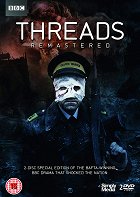Regie:
Mick JacksonDrehbuch:
Barry HinesKamera:
Andrew DunnBesetzung:
Karen Meagher, Reece Dinsdale, Rita May, Anne Sellors, Phil Rose, Patrick Allen, Richard Albrecht, Ed Bishop, Michael O'Hagan, Brian Grellis (mehr)Inhalte(1)
Das Paar Ruth und Jimmy wohnen in Sheffield, Ruth ist schwanger. Die beiden schmieden Pläne für die Zukunft, doch die Nachrichten verkünden Krieg am persischen Golf: ein globaler Konflikt schwelt und schon bald explodieren Atombomben in Großbrittanien. (Verleiher-Text)
Kritiken (8)
I understand why I spent four years looking for it, and why I waited another year to watch it, thinking I had to be in the right mood. That didn’t work. In fact, it can't. What is depicted is not suggestiveness, but rather spews depression and hopelessness in a massive geyser. Reality can't be imagined any worse than this... and then comes reality itself.
()
The standard for rating all other post-apocalyptic movies, which in comparison to Threads come across as easy-going soap operas. It’s not entirely fair to judge Mick Jackson’s super-realistic thriller according to the same criteria as “narratively integrated” live-action films. It lacks a plot in the traditional sense of the word, the staged situations are supplemented with documentary footage and cold-blooded off-camera commentary (which diminishes the authenticity of what’s being watched and rather elicits the feeling that we are watching an educational film). The film gives off the same kind of coldness, as it is a great means of spreading nuclear panic due to the prevailing sense of hopelessness and the elimination of direct criticism (whether of individuals or of the system) and thus the possibility of defining oneself against something specific (there is no clearly defined enemy, person or object whose destruction could represent a solution, as is usually the case in Hollywood disaster movies). But why delude ourselves into thinking that the situation would look any better in reality? On the contrary, the film can be seen as being optimistic at least in the sense that it doesn’t deal with “alternative” mass suicides, which I personally find highly probable in similar circumstances. 85%
()
"In these early stages the symptoms of radiation sickness and the symptoms of panic are identical." Disconcertingly powerful. Even from today’s point of view. I don’t even want to imagine the reaction it provoked when it was made. When I was watching it, it assumed that Robert Merle must have collaborated on the screenplay. The topic, the way it was made using documentary excerpts, the characters and the message all sound like they come from his pen. Together with following the fates of two ordinary families from Sheffield, the documentary clips form a “before, during and after" apocalyptic saga. And what about this being a TV movie? That is it’s greatest plus, because it’s that TV minimalism that gives it an absolutely exceptional stamp of reality. Let alone the ingenious use of silence that speaks volumes. This all applies until Ruth sets off into the desolation to look for Jimmy. This scene contains absolutely everything possible, and in its wake the last half hour simply states the obvious and then too rushed for all the events going on. That unfortunately spoils the otherwise phenomenal impression gained before.
()
A most depressive film. Unfortunately, Threads is a lot more documentary (descriptive) than film proper (narrative), I would much rather see the same situation told in a normal way, it could be a fantastic. This way it’s only a brilliant statement that everyone should see. I really hope that I will never have the chance to compare this vision with reality.
()
Many will say that Threads is amateur garbage, they couldn’t be further from the truth. The combination of naturalistic images, documentary elements, complex structure and deliberate emotional detachment results in a valuable masterpiece that is painful to watch, but at the same time impossible to look away from. The film is neutral about the dreaded issue and uses the characters as tools to manipulate the viewer, as a point of contact in the recapitulation of "real events". The plot is nothing but a pretext for a statement, which itself is a means of formal self-awareness (commentary and subtitles with data and statistics) and to generate a response from the viewer through everyday realistic motivations (the introductory information about the escalating conflict through TV news and radio). With the enemy and the possibility of salvation remaining absent and the afflicted humanity and the devastated environment coming to the fore, it is also a piece of work that is both timeless and current. And the sequence of the nuclear attack is very smartly and effectively staged, it will make your blood clot.
()
Galerie (13)
Photo © British Broadcasting Corporation (BBC)



Werbung